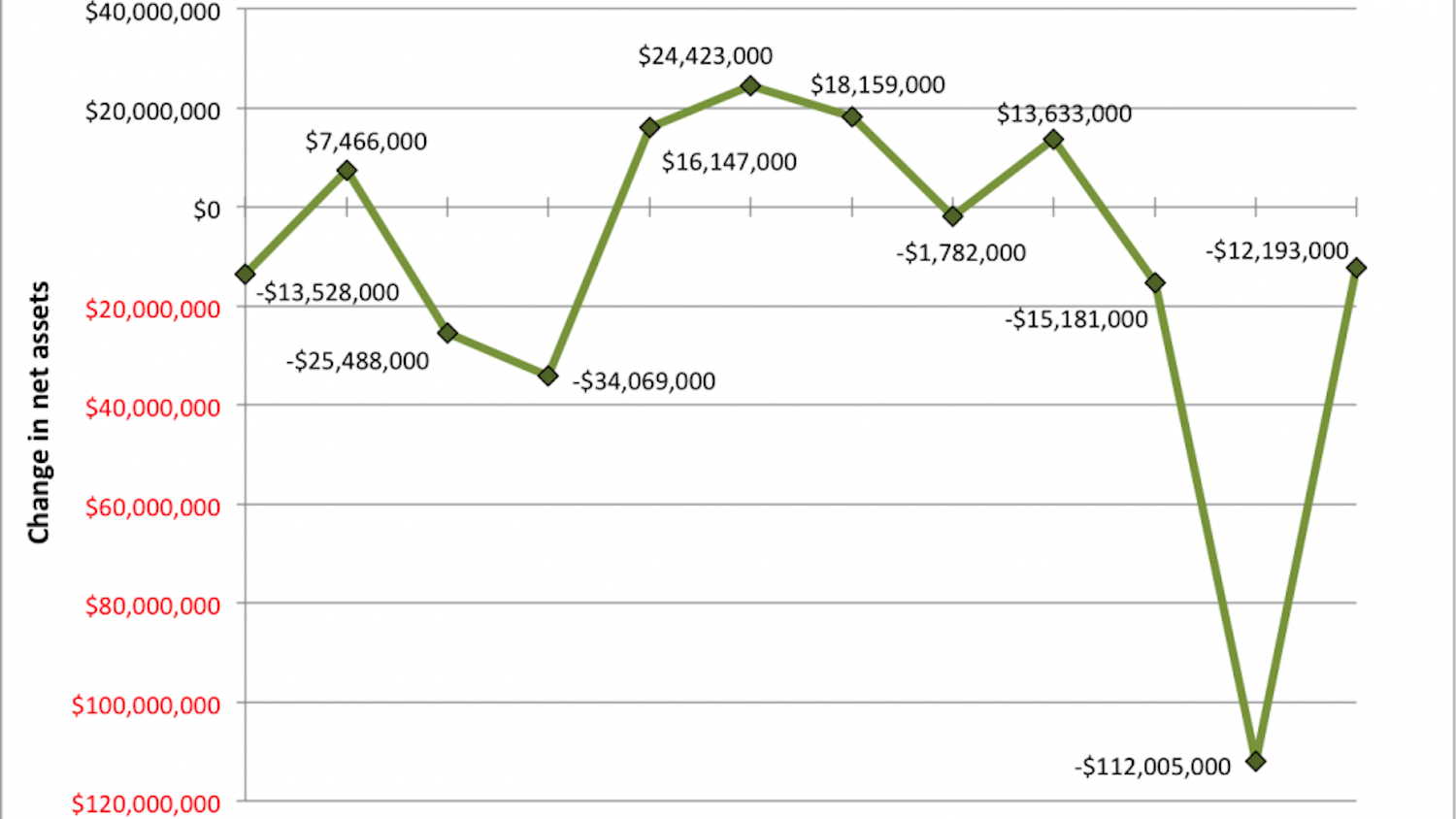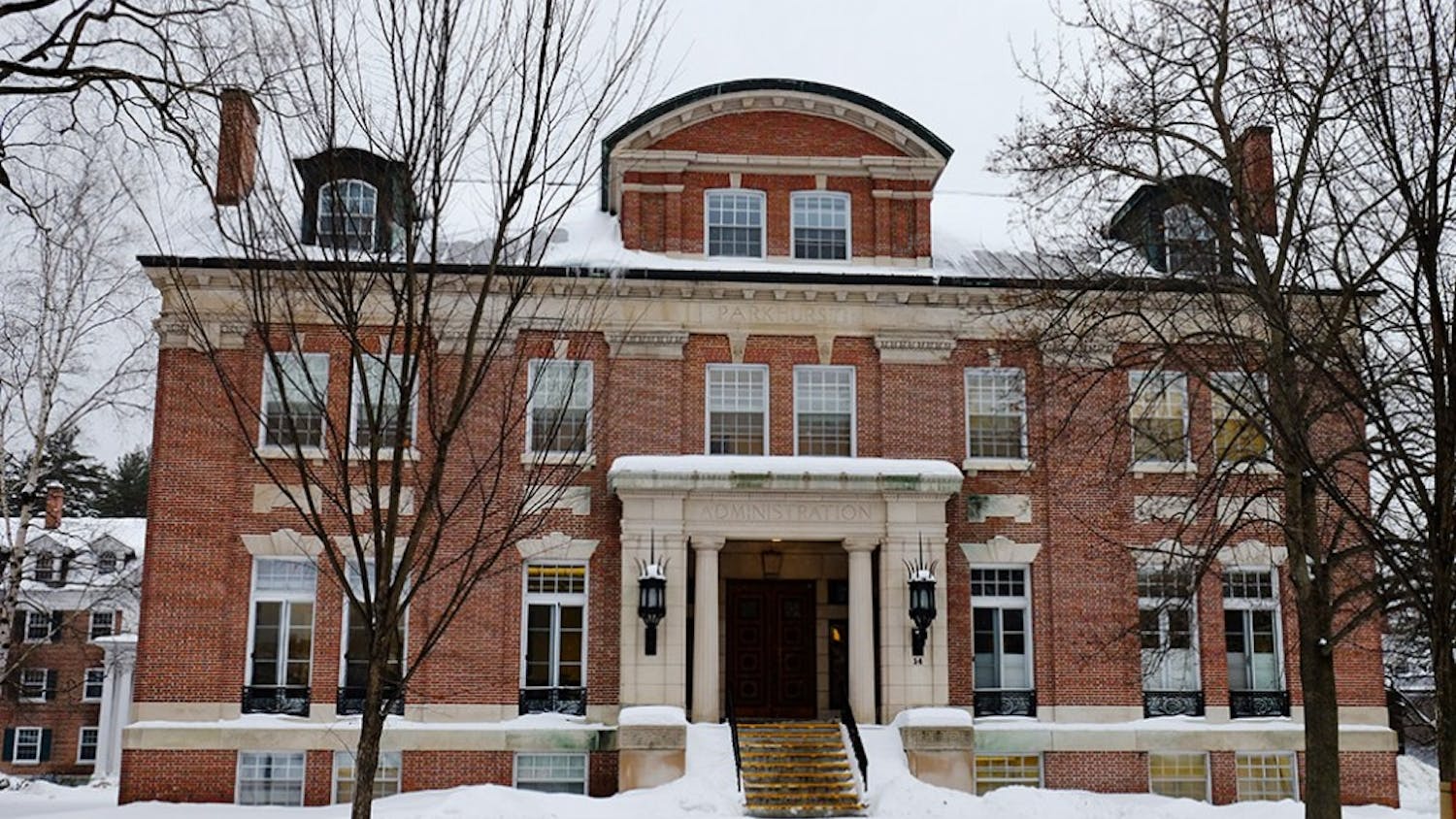The numbers jump off the first few pages: $8 billion in assets, $344 million in operating surplus, a presidential salary of nearly $1.2 million. Dartmouth’s 2018 tax returns paint the portrait of a wealthy institution, headed by highly paid executives and officers, with financial interests spanning the country and the globe.
The College reported over $1.435 billion in total revenue, including $404 million in contributions and grants, $519 million in program service revenue — meaning tuition, fees, housing, dining, ticket revenues and other education-related transactions — and $475 million in investment income. The College’s total assets grew by nearly $393 million to total $8.275 billion including $351 million in contributions and grants, $504 million in program service revenue and $377 million in investment income.
On the expense side of the ledger, the College reported $1.091 billion in costs, including $175 million in grants paid out — including financial aid — and $506 million in salaries and benefits. This is slightly down from the previous year, when the College reported $1.107 billion in costs.
The highest salaries that the College pays are listed on the form. College President Phil Hanlon’s nearly $1.2 million salary and $247,000 in additional benefits, including a retirement package and travel, are an increase from last year, when he earned $1.1 million and $245,000 in benefits. Two years ago, Hanlon earned just over $1 million and $250,000 in additional benefits.
Hanlon’s salary falls within the range of other comparable schools’ presidential compensation, but some presidents make far more. In 2017, former Harvard University president Drew Faust made over $1.7 million, Princeton University president Christopher Eisgruber made just under $1 million, Duke University president Richard Brodhead made over $1.4 million, University of Pennsylvania president Amy Gutmann made $3.9 million and Columbia University president Lee Bolinger made nearly $4 million.
Chief financial officer Mike Wagner said that paying high salaries is necessary to keep Dartmouth competitive in the world of higher education administrators.
“Part of what [the compensation committee] looks at is what that individual would be making if they were at another Ivy-plus institution,” Wagner said.
Former provost Carolyn Dever made $747,395, Geisel School of Medicine dean Duane Compton made $772,290, Tuck School of Business dean Matthew Slaughter made $833,988 and deputy chief investment officer Kelsey Morgan made $873,824. Trustees receive no salary for their positions.
The College’s 2018 fiscal year stretches from July 1, 2017 to June 30, 2018. Listed salaries represent total payment in calendar year 2017, not fiscal year 2017, in order to line up with individual tax return filings, according to Wagner. This distinction is why chief investment officer Alice Ruth, who joined in April 2017, appears to have made less than her deputy despite her higher ranking: her listed salary of $668,139 only represented eight months of work.
The upper echelons of the investment office, along with Geisel School of Medicine psychiatry department chair Alan Green, are listed as the highest-paid employees after the president, officers, and “key employees,” meaning employees with salaries greater than $150,000 and whose responsibilities are “similar to those of an officer,” according to Wagner.
In addition to high salaries, Dartmouth also gives “incentive compensation” to a few employees, mostly in the investment office, who hit targets given to them by the compensation committee.
Dartmouth’s fundraising also appears in the tax documents. Wagner noted that the “quiet phase” of the Call to Lead capital campaign, which allowed the College to officially launch the campaign in April 2018 already halfway to its target of $3 billion, would have showed up in previous years’ filings.
“All the contributions in fiscal [year] 2018 would be counted toward the Call to Lead,” Wagner said.
He also cautioned that while the campaign counts pledges of support, those pledges would not be listed on tax forms until after the College actually received the money.
Dartmouth spent just under $34,000 on lobbying activities during the 2018 fiscal year, far less than several peer institutions. In 2017, Harvard spent nearly $500,000, Duke spent nearly $250,000, the University of Pennsylvania spent nearly $900,000 and Columbia spent just over $500,000.
Dartmouth’s spending primarily focused on the Trump administration’s attempts to repeal the Deferred Action for Childhood Arrivals program that allowed certain classes of undocumented immigrants brought to the United States as children to remain in the country.
“Our students and faculty can be affected by what’s going on with immigration policy,” Wagner said. “This can be that we hire individual lobbyists, but it’s more likely that we are participating with other universities … to share the cost of a lobbyist,” he added.
Wagner also noted that, in the past, Dartmouth has had to lobby against efforts by the New Hampshire legislature to tax non-profit institutions.
“If there are proposals in Concord about putting a tax on tax-exempt organizations, we might have a lobbyist who would go talk to people in the statehouse,” Wagner said.
Dartmouth did not pay for lobbying against the 2017 Tax Cuts and Jobs Act, the federal tax overhaul that included a excise tax on endowment returns for private universities with endowment per student over $500,000 — affecting about 30 colleges around the country, including Dartmouth. That tax will appear on Dartmouth’s returns next year.
Wagner said that while he understands why the endowment would be seen as a “pocket of money” to raise revenue, the total amount raised would be minimal in the overall federal budget. Dartmouth, he estimated, would be paying roughly $5 million.
“There’s a lot of questions about whether or not it will achieve its intended purpose, because it’s not going to generate that much income,” Wagner said. “It’s been U.S. policy to allow not-for-profits, including universities, to not be taxed except for certain kinds of activities that should be taxed,” he added.
The College does currently have a small amount of income taxable under federal law, which Wagner said was mostly because the College has some earnings on “debt-financed activity.”
“It’s just a core principle of non-profits that you can’t borrow and generate income on it,” Wagner said.
The TCJA lowered the rate on corporate taxes from 35 percent to 21 percent, so Dartmouth actually benefited from the corporate tax cut because all income earned after January 1, 2018 was taxed at the new, lower rate. All in all, Dartmouth paid just under $3 million in corporate taxes this year, the majority of which was covered by a carried-over loss from the previous year.
In a section titled “Statement of Activities Outside the United States,” Dartmouth reports $1.5 billion in investments located in “Central America and the Caribbean,” roughly 96 percent of the budget for all activities listed. Wagner said that this is because Dartmouth’s endowment has investment partners, such as hedge funds and venture capital firms, that are domiciled in zero-tax countries in order to gain “favorable tax treatment.”
“We invest in them, and because they’re located there, we have to disclose them as being activity based outside the United States even though their investments may very well be in the U.S or in Europe,” Wagner explained.
Tuck accounting professor Richard Sansing explained that this arrangement is helpful for companies that invest the money of investors from more than one country. If the firm is domiciled in a country with high taxes, investors may be concerned that they will be taxed in both their home countries and abroad, wherever the company is based. By basing the company in a low-tax jurisdiction — for example, the Cayman Islands — investors can avoid hassle, according to Sansing.
“If I’m [a U.S. investor], I’m still fully taxable in the U.S. on the earnings from my Cayman Islands business,” Sansing said. “The reason these things are organized in Caribbean islands like the Cayman Islands is that it is an investment vehicle that tries to attract international investors, and none of the international investors want to have any tax headaches.”
“Where offshore investments have gotten bad press is where people are hiding money in those offshore investment vehicles,” Wagner said. “That’s very different than what you see here.”





